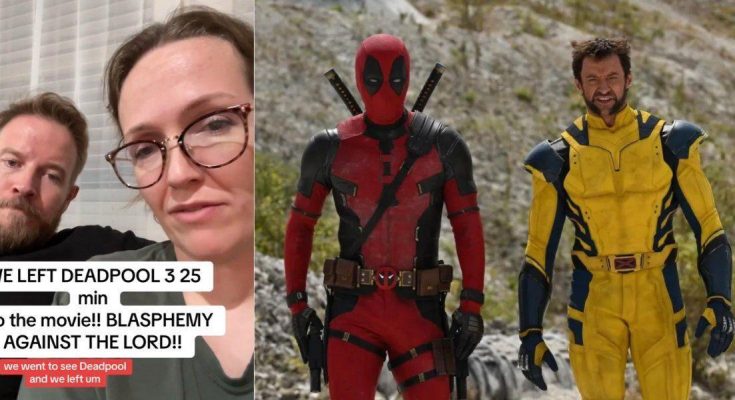Conservative Christians Roasted After Boycotting ‘Deadpool & Wolverine’ For Being ‘Blasphemous’
After Christians on social media said they’re boycotting ‘Deadpool & Wolverine’ due to ‘blasphemy,’ the internet—including notorious TikToker Tizzy Ent—swiftly stepped in to mock them.
Conservative Christians were mocked on social media after boycotting the hit film Deadpool & Wolverine for being “blasphemous.”
The criticism stems from a scene in the new hit sequel where Ryan Reynolds‘ title character refers to himself as “Marvel Jesus” and Hugh Jackman’s Wolverine is depicted crucified on an X-shaped cross.
Deadpool, the alter ego of Wade Wilson, is a disfigured Canadian mercenary with superhuman regenerative healing abilities. He is famous for his incessant joking and habit of breaking the fourth wall and pushing boundaries for comedic effect.
But conservatives’ anger and discomfort was palpable nonetheless.
— (@)
— (@)
Notorious TikToker @tizzyent shortly after weighed in, pointing out the ridiculousness of this manufactured controversy:
“[The film] has been very well received by everyone except for one group who does get offended by a lot of things it seems and when they get offended they make sure it’s everyone’s problem. … The viral marketing for this thing is wild. I was already rigid but you guys are really hammering it at the end zone.”
He noted that the “Marvel Jesus” reference is actually in the “very first trailer” for the film that premiered during the Super Bowl “that everyone saw,” adding:
“For the people who are very upset about this and say you shouldn’t watch Deadpool because of it, do you also boycott Star Wars or The Matrix or The Iron Giant or E.T.? Because Neo is Jesus and Luke Skywalker is Jesus and E.T. is Jesus and the Iron Giant is Jesus.”
“There are a multitude of films that have a savior character that is essentially Jesus and Deadpool films always break the fourth wall. They call out the things they’re doing, they’re embracing tropes, just pointing it out. He calls himself ‘Marvel Jesus’ because he’s the savior character in Marvel at this moment like Jesus.”
“So it’s not so much blasphemy as it is spoon-feeding the audience story beats so we’re all in on the joke that went over some people’s heads apparently.”
He also addressed a video made by two teenagers who criticized the scene wherein Wolverine is shown crucified on an X-shaped cross”:
“You know what else you might call a cross laid sideways? An X, like X-Men? That image is based on an extremely famous cover from The Uncanny X-Men. … All of the Wolverines in the montage are based on famous images of Wolverine from the comic books and you know that if you weren’t just someone who went and saw the movies and didn’t hit 90 percent of the references.”
“Enjoy it or don’t. Feel free to be offended but we don’t need to hear about it. We don’t care. We’re laughing at you.”
You can see what he said in the video below.
The mockery was swift.
This is of course not the first time conservative Christians have lashed out at Marvel comic book media.
Earlier this year, they were roasted after a reimagining of the X-Men character Morph as nonbinary in the upcoming animated series X-Men ’97‘ set them off.
The animated series, a revival of the beloved ’90s X-Men animated show, features a nonbinary hero in its main cast. Morph, a shapeshifting mutant from the original series, is portrayed as nonbinary, bringing a fresh perspective to the iconic character.
The news marked the first time Morph’s nonbinary identity has been explicitly portrayed, a decision that aligns with the character’s ability to shapeshift into any form, offering a progressive approach to gender representation.
However, the announcement triggered a backlash from conservative and toxic fan circles on social media, who criticized the franchise for being “woke.” Ultimately, many X-Men enthusiasts highlighted the franchise’s longstanding tradition of serving as a metaphor for marginalized groups.
Related Posts
About reachsiung






